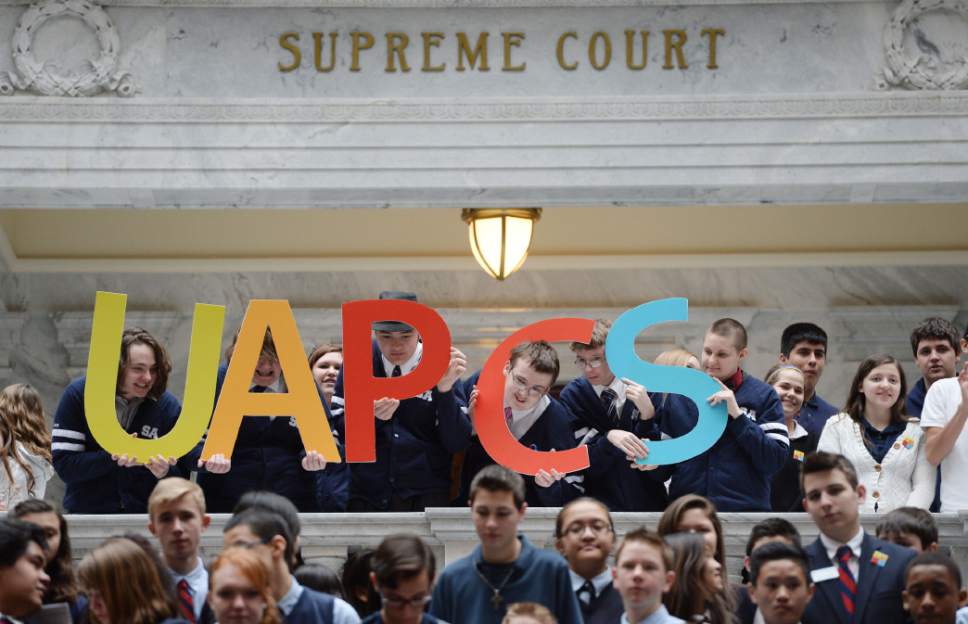This is an archived article that was published on sltrib.com in 2016, and information in the article may be outdated. It is provided only for personal research purposes and may not be reprinted.
[Video: This one's kind of a reach. But it's what came up when I googled "government school." Flash from the past. Enjoy.]
If you want to advance your side in a public policy debate, one of the most useful tricks is to bend the language to elicit the emotional response you want from your audience.
For example, last weekend two different op-ed contributors to The Salt Lake Tribune wrote about education policy. Both are skilled policy wonks and political advocates. And they know how to push people's buttons.
Royce Van Tassell knows that if he wants the readers of the Tribune to support his cause — charter schools — he is well advised to call them, "public charter schools."
That's fair, because charter schools are a variety of public schools. At least, they are paid for mostly with taxpayers money.
It's also clever, because the knock against charter schools, justified or not, is that they are somehow exclusive or selective. That they are a place for people who aren't rich enough to put their children in high-priced private schools but who want to hide them from certain racial, ethnic, religious or socioeconomic portions of the population.
[Full disclosure: I really only know anything about one charter school, the one my younger son attends. We like it a lot and there is certainly no shortage of ethnic diversity. It also has a student population somewhat smaller than the complement of an aircraft carrier, which is what we wanted.]
Meanwhile, Connor Boyack, head of the Libertas Institute, wants to discourage people from backing a proposed tax increase that would go to public schools.
His problem is the opposite of Van Tassell's. Like the charter school guy, he knows that people, particularly upper-middle-class Utahns who vote, mostly like things that are public — public schools, public parks, public libraries, public safety. They like them so much they will even pay for them.
So Boyack adopts lingo often used by both conservatives and libertarians. He calls them "government schools."
Which is also fair, because they are an arm of government, empowered to collect taxes, issue bonds and make lots of rules. But it is also a way to paint them with an image that's very different than the more welcoming "public," and hang them with the aura of, ew, government. Taxes. Potholes. Prisons. The DMV.
Boyack also raises an argument that is all government and no public. All burden and no benefit. He notes that, according to a recent poll, some 30 percent of Utah voters think they pay too little in taxes to support schools and would be willing to pay more.
"Of course," Boyack snarks, "nothing is stopping these individuals from voluntarily paying more of their own money to the government should they truly feel this way. And yet, shockingly, that's not happening."
This argument is among the worst ever put forward by those discussing tax policy. Which doesn't stop it from being used a lot.
There are good reasons to give money to a school or a foundation that supports some public institution such as parks. It can do some good. But when a city, state or nation is facing large needs, if you give more money to a government program when nobody else is, you are not a philanthropist. You are a chump.
You are out what may be a significant amount of money for you, but you, and the few who join you, cannot possibly cough up enough to make a difference at a community, state or federal level. That's why taxes are, or should be, mandatory across the board. Without the scale, they are pointless.
It would be as if you and the president agreed that we needed to go to war, but the president didn't have the power or the guts to institute a draft. So you raise a company of volunteers and go into battle against far superior forces. And get annihilated. What you gave up, in a noble cause, was significant for you, but gained nothing for the greater good.
That's why, for example, such gazillionaires as Warren Buffett and Bill Gates won't help their fellow moneybags do such things as eliminate the estate tax. They are more or less happy to pay their taxes, and they pay a lot. But they know that if it ever becomes voluntary, they would be stupid to keep paying as much as they pay now because so many others wouldn't, and the good that could be done with their money would be so sharply diminished as to be useless.
Many of the people who are smart enough to be that rich know what they owe the public. Even if they have to filter it through the government.
George Pyle, a Tribune editorial writer, fancies himself a public intellectual, not a government expert, which would be much harder.



